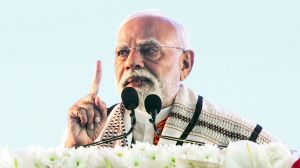Commerce, industry secys speak in different tones on FTA impact
Exports have to grow 25-30 per cent for manufacturing to grow 16 per cent.
 Industralists takes part in the National Council Meeting of CII in New Delhi on Tuesday. (Express photo: Praveen Khanna)
Industralists takes part in the National Council Meeting of CII in New Delhi on Tuesday. (Express photo: Praveen Khanna)
The commerce and industry departments are, it seems, not in agreement over the alleged adverse impact of free trade agreements on Indian industry. This was evident at the National Council Meeting of the CII, where the secretaries of the two departments gave contrary views on the impact of free trade agreements (FTAs) India has entered into with other countries.
Speaking first, commerce secretary Rajeev Kher said that according to the study conducted by his department, it was found that the utilisation of FTAs by the trading partner was not much. However, industry secretary Amitabh Kant, who spoke after Kher left, said that the FTAs have adversely impacted manufacturing in the country.
“As far as this myth that FTAs have been extremely difficult and caused damage to some of the sectors, we are in the process of impact analysis…we have found that of Japan’s total trade with India, only 22 per cent could be attributed to the FTA, Malaysia 3.47 per cent, Asean 17 per cent and Korea 25 per cent, benefited from having FTA with India.
However, utilisation by trading partners is not so much that it worries us,” Kher said.
However, the benefit India has been able to capture due to these FTAs is not yet clear due to lack of data, “which has been sought from the trading partners”, the commerce secretary said.
FTAs came under fire last year when former finance minister P Chidambaram cautioned the commerce ministry against hasty signing of FTAs. India has signed FTAs with about 20 countries including Japan, Korea, Asean, and Sri Lanka while it is negotiating such pacts with Australia, Canada, New Zealand and the EU.
Former commerce minister Anand Sharma had defended them saying that India’s exports gained from the regional and bilateral free trade pacts.
Kant, however, said, “I have told the commerce secretary that FTAs have impacted manufacturing. You have to set it right. The FTAs you have signed you can’t do anything about them but we are trying to find a solution.” He added that a study by the Tariff Commission showed that FTAs have created inverted duty structures.
Further, on special economic zones (SEZs), the commerce secretary said that a “package”, including rollback of minimum alternate tax could be announced soon to revive the zones.
On the manufacturing sector, Kant, while terming the World Bank’s study on ‘Doing Business’ as flawed, said it is important “that we get the manufacturing story back. It has to be the key driver. According to estimates, 17 million jobs per year would be needed. This would mean 1.5 million jobs per month…Only way to catch up with the world is to leapfrog technology”. The World Bank has placed India at the 134th place in terms of ease of doing business.
Buttressing his argument, Kant said that while India has been a “reluctant urbaniser, hesitant manufacturer and an unwilling infrastructure creator”, it is now important for the country to put its house in order for the business to flourish.
“For ease of doing business, you have to delegate the powers…Exports have to grow 25-30 per cent for manufacturing to grow 16 per cent. Every single FDI has been impacted by the taxation requirement in India. This has been corrected now in the Budget,” he said.






- 01
- 02
- 03
- 04
- 05

























